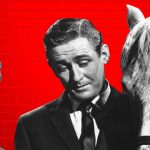Merle Haggard is without a doubt one of the greatest country music stars of all time. Throughout his incredible career, he had dozens of number-one hits on the US country charts – many of which also made it to the top of Billboard’s all-genre singles chart.
For his many contributions to the world of country music, Haggard was honored with numerous awards and accolades, including a Kennedy Center Honor in 2010, a Grammy Lifetime Achievement Award in 2006, and a BMI Icon Award in 2006. In 1977, Merle was inducted into the Nashville Songwriters Hall of Fame, and in 1994, he was inducted into the Country Music Hall of Fame.
Throughout his fifty-plus years in the music business, Haggard collaborated with fellow country legends like George Jones, Willie Nelson, Buck Owens, and even Clint Eastwood! Undoubtedly, his name will forever be listed among the genre’s greats!
Haggard was instrumental in popularizing the genre of outlaw country. Known for challenging the Nashville status quo with his iconic Bakersfield sound, Merle always pushed the limits while remaining uncompromisingly true to himself. From his first studio album, Strangers, in 1965, which gave us classic tracks like My Friends Are Gonna Be Strangers and The Bottle Let Me Down to 2015s Willie Nelson collaboration Django & Jimmie, it seemed like everything that Haggard touched turned to gold.
As impossible as it might be to imagine what the country music genre would look like without him, it blows your mind when you realize just how close Merle got to never making his first big break. The legend nearly failed to launch after getting sent to prison as a young man. During his young buck days, Merle Haggard lived out the country outlaw lifestyle unapologetically. Fortunately a string of events, including a chance encounter with another country music legend, led him to eventually hop back on the straight and narrow.
Keep watching to learn how Merle Haggard left his life of crime after a fateful encounter that changed his life forever.
Born In A Boxcar
Merle Ronald Haggard was born in Olidale, California, on April 8, 1937. During the Great Depression, Merle’s parents Flossie Mae and James Francis Haggard, moved to California after their barn burned down in 1934.
Haggard and his family lived in a railroad boxcar that had been converted and expanded into a full-fledged house. Merle’s father added a bathroom, second bedroom, kitchen, and breakfast nook to the boxcar frame, and before you knew it, it no longer even resembled a rail car.
Haggard’s dad died of a brain hemorrhage in 1946. Merle, who was just 9 at the time, was deeply affected by the loss, and it proved to be a pivotal event for him for the remainder of his life. In order to support her family, Haggard’s mom found work a bookkeeper.
Merle’s older brother Lowell gave him his first guitar when he was 12. He quickly learned how to play it listening to records he had at home. He was especially influenced by the music of early country legends like Hank Williams, Bob Wills, and Lefty Frizzell.
While Merle’s mother was away from the home working, he began getting into trouble. Eventually, his mother sent him to a juvenile detention center for a weekend in a desperate attempt to try and correct his behavior, but that proved to be ineffective. If anything, it only made his bad behavior that much worse.
By the time he was 13, Haggard was committing theft and writing bad checks. In 1950, he was arrested for shoplifting was sent back to Juvi. The following year, Merle ran away from home with his buddy Bob Teague to Texas. The two trouble-making boys hitchhiked and hopped freight trains throughout the state. When they returned back to California later that year, the two were accused of committing a robbery and were shipped off to jail despite the fact that they had not actually done the crime in question.
When the real robbers were found, Haggard and Teague ended up getting released from jail, but even that experience wasn’t enough to alter Haggard’s course. He was sent back to Juvi yet again later that year. There, he and a friend staged an escape and made their way to Modesto, California.
There Merle found work doing a series of labor jobs, including driving a potato truck, working as a short-order cook, and serving as an oil well shooter.
Merle made his debut performance with Teague in a Modesto-area bar called the Fun Center. The two were paid $5 and given free beer. In 1951, he returned back to Bakersfield where he was once again arrested for truancy and petty larceny and sent back to a juvenile detention center. After escaping once again and getting caught, he was sent to a high-security facility called the Preston School of Industry. 15 months later, he was released but was sent right back after beating up a local boy during a botched burglary attempt.
After his release, Haggard and Teague saw Lefty Frizzell perform in concert. The two sat backstage, and throughout the performance Haggard sung along to each song. Hearing him from stage, Frizzell refused to continue playing unless Haggard came out and sang first. Being invited out onstage by one of his childhood heroes, Haggard obliged and was received quite well by the audience. It was at this show that Merle decided that he wanted to pursue a career in music.
In the early days of his musical career, Merle would sing and play at local bars in the evenings while working as a farmhand or oil worker during the day.
Merle Owed Johnny Cash Almost Everything
In 1957, Haggard, who was plagued by money issues and marriage problems, attempted to rob a Bakersfield roadhouse. His attempt failed, and he ended up getting arrested. After being convicted of his crimes, Haggard was sent to the Bakersfield Jail. After a failed escape attempt, Merle was transferred to San Quentin Prison in February 1958, where he was assigned the inmate number A45200.
While serving at San Quentin, Haggard organized a gambling and covert booze-making operation with one of his cellmates. After getting caught drunk, he was put into solitary confinement for a week, where he came across author and death-row inmate Caryl Chessman.
He had planned to attempt another escape, but his friend James Kendrick who went by the nickname Rabbit ended up going though with the plan without him after he was dissuaded by fellow inmates. Rabbit shot and killed a police officer during his escape and was quickly returned to San Quentin to be executed.
Meeting Chessman and learning about Rabbit’s fate led Merle to want to change his life. He got to work earning his high school equivalency diploma and maintained a steady prison job at a textile plant.
Merle was just 20 years old when he got to see Johnny Cash perform at San Quentin. At that point, he was serving out a 15-year sentence which means he really did turn 21 in prison, just as his country classic “Mama Tried” laments. Seeing Johnny Cash play on New Year’s Day in 1959 inspired Merle to join the prison’s country music band. He knew that after his release, rather than returning back to a life of crime which would inevitably bring him right back to a prison cell, he’d instead devote his life to writing and performing country music.
After an early release in 1960, Haggard got straight to work and recorded his first Billboard Top 20 hit song within three years.
Fast forward to 1969, when Merle had numerous hits under his belt, he got the chance to appear on Johnny Cash’s TV show.
Between songs, the two country stars had an exchange that is almost too good to be true. After Cash mentioned San Quentin, Haggard said that it was there that he first got to see Johnny perform.
Cash responded by saying that he didn’t remember him being at that show. Merle shot back with “I was in the audience, Johnny’.
Ronald Reagan Pardoned Haggard
In 1972, then-Governor of California, Ronald Reagan, Pardoned all of Merle Haggard’s past crimes. Merle was so touched by the gesture that he even mentioned it when he performed life for Ronald ten years later when he was President.
He told the audience at that concert that he hoped the President was as pleased with his performance as he was when Reagan pardoned him ten years prior.
Haggard later told reporters that Reagan’s pardon changed his life. He told CMT in 2004 that up until that point, he felt like he had a ‘tail hanging’ on him, but after the pardon, it was gone.
As an ex-convict, he had to jump through all sorts of hoops that regular law-abiding people don’t have to. Everything from filing legal paperwork to leaving the country is much more difficult when you’re a felon, but thanks to Ronald Reagan’s kindness, he was able to finally just be normal guy. No longer did he have to introduce himself to people immediately asking them to forgive him for his past indiscretions. Simply put, Reagan set him free.
Unfortunately, Merle spent much of his life as a heavy smoker, drinker, and drug user. In 2009, he announced that he had been diagnosed with lung cancer. A few months later, he had surgery to remove part of his lung.
In 2015, Haggard was treated for pneumonia but fortunately made a recovery. In March of 2016, Haggard was hospitalized once again with pneumonia. He passed away from pneumonia complications on the morning of April 6, 2016, which happened to be his 79th birthday.
While Merle’s been gone for more than six years now, he won’t soon be forgotten. Nobody can deny just how influential he was to the country music scene. To think, he nearly never got a chance to make his big break! If it weren’t for Johnny Cash and Ronald Reagan, there’s no telling whether or not Merle Haggard would have accomplished as much as he did throughout his storied career.
What’s you’re favorite Merle Haggard song, and did you know that he spent the first couple decades of his life in and out of prison? Let us know in the comments.


